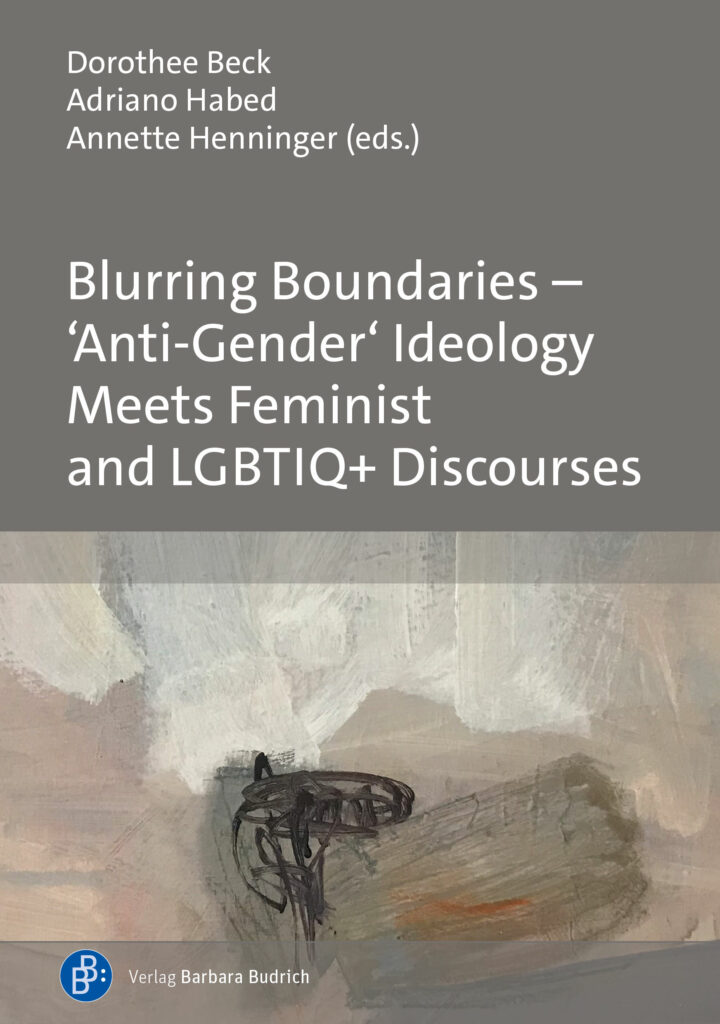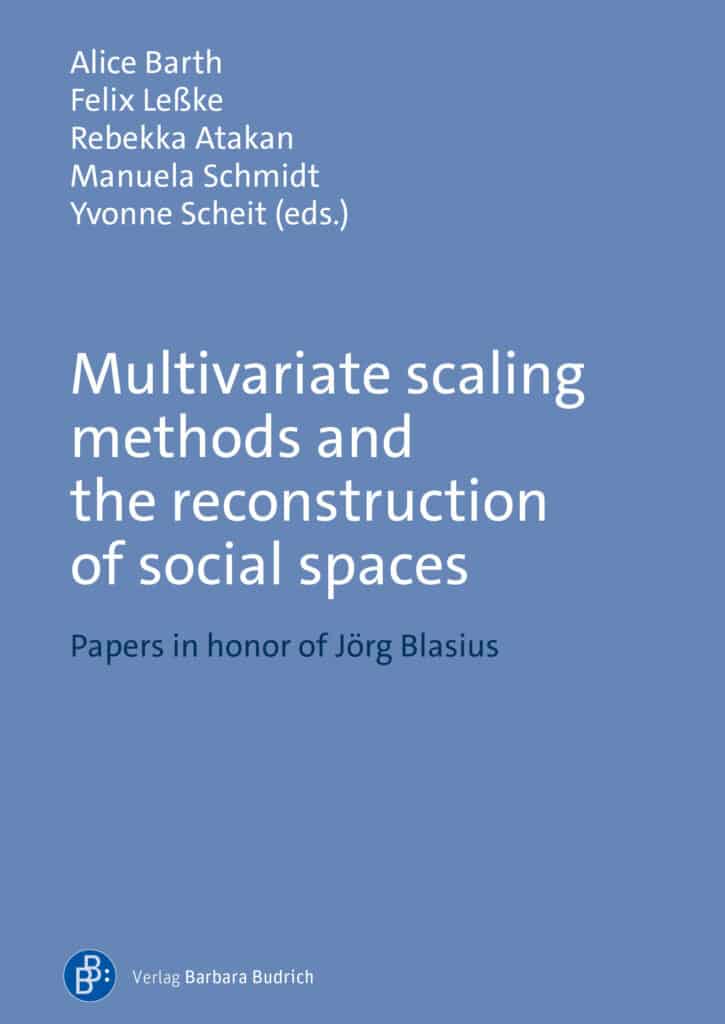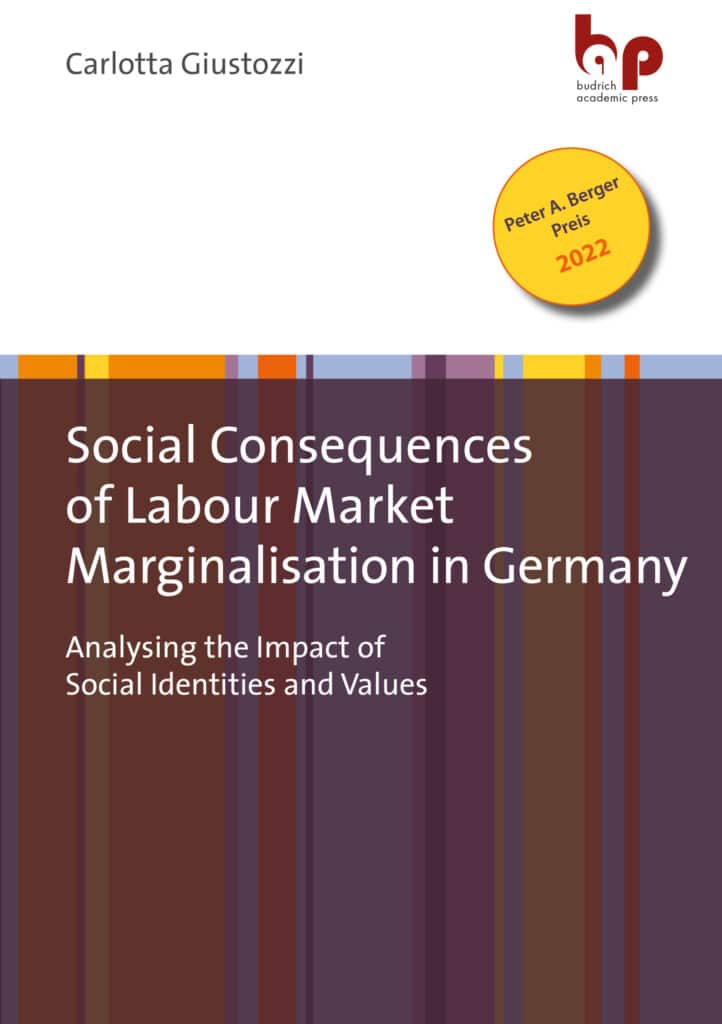Informationen zur Zeitschrift
Startseite » Programm » IJAR 3-2023 | Free Contributions
IJAR 3-2023 | Free Contributions
Erscheinungsdatum : 26.02.2024
29,00 €
Inhalt
IJAR – International Journal of Action Research
3-2023: Free Contributions
Editorial
Miren Larrea: Legacy and future perspectives of action research
Hans Christian Garmann Johnsen / Richard Ennals: Obituary of Olav Eikeland
Interview
León Staines-Díaz / Danilo Streck / Miren Larrea: A practitioner’s journey of change: Interview with Leon Staines
Articles
Davydd J. Greenwood: Action Research as Understood and Practiced by Olav Eikeland: An Appreciation
Olav Eikeland: Why Should Mainstream Social Researchers Be Interested in Action Research?
Isabella Paoletti / Elisabet Cedersund / Konstantin Economou: Moral awareness and different orders of relevance in participatory research with older people and professionals
Cathrine M. S. Winther / Michael Søgaard Jørgensen: Engaging youth in the local environment. Promoting sustainability action competence in Danish high school teaching through citizen social science
Alexandra David / Judith Terstriep / Silke Steinberg: Action Research: A Participatory Approach to Improve Measures of Labour Market Integration of Refugees
León Staines-Díaz: Participatory Action Research for Urban Connectivity: Bridging Inequality in Metropolitan Monterrey
Book Review
Telmo Adams: TORRES CARRILLO, Alfonso. Pensamiento epistémico, educación popular e investigación participativa. Mexico City: Editora Nómada, IPECAL, 2019
Download of Table of Contents / Inhaltsverzeichnis herunterladen
Extracts / Leseproben
Download of single articles (Open Access/fee-based): ijar.budrich-journals.com
You can register here for the IJAR alert.
Einzelbeitrag-Download (Open Access/Gebühr): ijar.budrich-journals.com
Sie können sich hier für den IJAR-Alert anmelden.
Zusätzliche Information
| Verlag | |
|---|---|
| ISSN | 1861-1303 |
| eISSN | 1861-9916 |
| Jahrgang | 19. Jahrgang 2023 |
| Ausgabe | 3-2023 |
| Erscheinungsdatum | 26.02.2024 |
| Umfang | 124 Seiten |
| Sprache | Englisch |
| Format | 17 x 24 cm |
| DOI | |
| Homepage |
Autor*innen
Schlagwörteraction research, citizen social science, counter-public spheres, data collection, dialogic interviews, ecosystem map, immanent critique, labour market integration, method of methodology, Monterrey, moral issues, older people, participatory action research, participatory research, practitioner research, pragmatic approach, refugees, research methods, social dimension of research activities, sustainability action competence, urban planning, youth civic engagement
Abstracts
Why Should Mainstream Social Researchers Be Interested in Action Research? (Olav Eikeland)
The essay tries to argue why conventional researchers are obliged as researchers to be interested in certain forms of action research. The 60 years of ignorance have been illegitimate. The essay starts by listing two commonly encountered arguments paraphrasing Karl Marx and Francis Bacon via Kurt Lewin. It tries to show why a certain simplified reading of Marx cannot provide the necessary arguments. It then presents different variants of action research in order to single out approaches that according to this author require attention from mainstream social researchers. The action research approach emerging as central, by demonstrating its presence and effectiveness within mainstream research as well, is immanent critique. The method of research methodology is immanent critique. Immanent critique has to be demystified, however. When it is brought down to earth, immanent critique is really the kind of dialogical and experiential learning approach associated with apprenticeship learning and with organisational learning. This conclusion, making self-reflective practitioner-research the “hard-core” of action research, even internal to mainstream research, also requires a revision of the experimentalist-as-interventionist credo of action research. Keywords: action research, counter-public spheres, immanent critique, method of methodology, practitioner research, research methods
» Buy Single Contribution (Budrich Journals) / Einzelbeitrag kaufen (Budrich Journals)
Moral awareness and different orders of relevance in participatory research with older people and professionals (Isabella Paoletti, Elisabet Cedersund, Konstantin Economou)
Limitations are described in the literature in relation to the actual involvement of older people in action research activities. Empirical social research involving any form of data collection has an impact on the people and the setting studied. Researchers should strive to be morally aware of such an impact. The article describes case studies of participatory research in Sweden, Italy and Portugal. It highlights moral issues confronted by researchers. Moreover actual examples of different order of priorities among researchers and participants are provided. The study shows possible spaces for collaboration, while recognizing the difference of interests and priorities among researchers and participants. Keywords: older people, participatory research, action research, moral issues, data collection, social dimension of research activities
» Buy Single Contribution (Budrich Journals) / Einzelbeitrag kaufen (Budrich Journals)
Engaging youth in the local environment. Promoting sustainability action competence in Danish high school teaching through citizen social science (Cathrine M. S. Winther, Michael Søgaard Jørgensen)
Many young individuals experience a sense of disconnection from their immediate environment, which adversely affects their engagement in civic activities. This article outlines experiences with a sustainability actionable approach in a Danish high school, and how it influenced young people’s understanding of the local environment. The study entails a threemonth collaboration with a teacher and 17 high school students in Copenhagen who were being trained as citizen social scientists. They investigated and proposed youth-friendly sustainable changes in the neighbourhood, which enhanced their sustainability action competence. The article discusses how an action-oriented framework may inspire high school teachers to incorporate citizen social science in planning education for sustainable development that supports youth civic engagement. Keywords: Citizen social science, youth civic engagement, sustainability action competence
» Buy Single Contribution (Budrich Journals) / Einzelbeitrag kaufen (Budrich Journals)
Action Research: A Participatory Approach to Improve Measures of Labour Market Integration of Refugees (Alexandra David, Judith Terstriep, Silke Steinberg)
This paper illustrates the benefits action research adds to successfully co-creating measures for the labour market integration of refugees. Germany has become one of the most popular immigration countries in the world. In addition to current refugee flows from Ukraine, migration from third countries such as Syria, Afghanistan and Turkey again increased in 2022. Compared to Ukrainians, who are subject to a special measure granting immediate and temporary protection in the event ofamass influx and direct access to the labour market, thirdcountry representatives still have a limited path to the world of work. Following these events, this paper is motivated by the early research on developing measures for the labour market integration of refugees in Germany. It was conducted shortly after the so-called European “refugee crises” during 2015–2017. Due to increasing refugee movements, the findings are highly topical and thus make a renewed contribution to integration policies and action research as a participatory approach. Keywords: participatory action research; refugees; labour market integration; pragmatic Approach
» Buy Single Contribution (Budrich Journals) / Einzelbeitrag kaufen (Budrich Journals)
Participatory Action Research for Urban Connectivity: Bridging Inequality in Metropolitan Monterrey (León Staines-Díaz)
This paper argues for participatory action research as a potent method for urban connectivity, surpassing government or expert-led methods. It introduces two approaches: integrating dialogic interviews to foster reflexivity and adopting an Ecosystem mappingbased approach encompassing social, economic, physical, and cultural dimensions. Dialogic interviews promote inclusivity by enabling diverse perspectives to shape research outcomes. Ecosystem mapping visually captures intricate connectivity dynamics. By combining participatory action research, dialogic interviews, and Ecosystem mapping, a robust framework emerges to address urban connectivity challenges. Empowering communities and embracing diverse axes of connectivity, this approach transforms urban planning practices, fostering contextually relevant and sustainable solutions. A co-created, resilient urban future becomes achievable through engagement and active stakeholder involvement. Keywords: Action Research, Dialogic interviews, Ecosystem map, Urban Planning, Monterrey
» Buy Single Contribution (Budrich Journals) / Einzelbeitrag kaufen (Budrich Journals)
Inhalt
Inhalt
IJAR – International Journal of Action Research
3-2023: Free Contributions
Editorial
Miren Larrea: Legacy and future perspectives of action research
Hans Christian Garmann Johnsen / Richard Ennals: Obituary of Olav Eikeland
Interview
León Staines-Díaz / Danilo Streck / Miren Larrea: A practitioner’s journey of change: Interview with Leon Staines
Articles
Davydd J. Greenwood: Action Research as Understood and Practiced by Olav Eikeland: An Appreciation
Olav Eikeland: Why Should Mainstream Social Researchers Be Interested in Action Research?
Isabella Paoletti / Elisabet Cedersund / Konstantin Economou: Moral awareness and different orders of relevance in participatory research with older people and professionals
Cathrine M. S. Winther / Michael Søgaard Jørgensen: Engaging youth in the local environment. Promoting sustainability action competence in Danish high school teaching through citizen social science
Alexandra David / Judith Terstriep / Silke Steinberg: Action Research: A Participatory Approach to Improve Measures of Labour Market Integration of Refugees
León Staines-Díaz: Participatory Action Research for Urban Connectivity: Bridging Inequality in Metropolitan Monterrey
Book Review
Telmo Adams: TORRES CARRILLO, Alfonso. Pensamiento epistémico, educación popular e investigación participativa. Mexico City: Editora Nómada, IPECAL, 2019
Download of Table of Contents / Inhaltsverzeichnis herunterladen
Extracts / Leseproben
Download of single articles (Open Access/fee-based): ijar.budrich-journals.com
You can register here for the IJAR alert.
Einzelbeitrag-Download (Open Access/Gebühr): ijar.budrich-journals.com
Sie können sich hier für den IJAR-Alert anmelden.
Bibliografie
Zusätzliche Information
| Verlag | |
|---|---|
| ISSN | 1861-1303 |
| eISSN | 1861-9916 |
| Jahrgang | 19. Jahrgang 2023 |
| Ausgabe | 3-2023 |
| Erscheinungsdatum | 26.02.2024 |
| Umfang | 124 Seiten |
| Sprache | Englisch |
| Format | 17 x 24 cm |
| DOI | |
| Homepage |
Produktsicherheit
Bewertungen (0)
Bewertungen
Es gibt noch keine Bewertungen.
Autor*innen
Autor*innen
Schlagwörter
Schlagwörteraction research, citizen social science, counter-public spheres, data collection, dialogic interviews, ecosystem map, immanent critique, labour market integration, method of methodology, Monterrey, moral issues, older people, participatory action research, participatory research, practitioner research, pragmatic approach, refugees, research methods, social dimension of research activities, sustainability action competence, urban planning, youth civic engagement
Abstracts
Abstracts
Why Should Mainstream Social Researchers Be Interested in Action Research? (Olav Eikeland)
The essay tries to argue why conventional researchers are obliged as researchers to be interested in certain forms of action research. The 60 years of ignorance have been illegitimate. The essay starts by listing two commonly encountered arguments paraphrasing Karl Marx and Francis Bacon via Kurt Lewin. It tries to show why a certain simplified reading of Marx cannot provide the necessary arguments. It then presents different variants of action research in order to single out approaches that according to this author require attention from mainstream social researchers. The action research approach emerging as central, by demonstrating its presence and effectiveness within mainstream research as well, is immanent critique. The method of research methodology is immanent critique. Immanent critique has to be demystified, however. When it is brought down to earth, immanent critique is really the kind of dialogical and experiential learning approach associated with apprenticeship learning and with organisational learning. This conclusion, making self-reflective practitioner-research the “hard-core” of action research, even internal to mainstream research, also requires a revision of the experimentalist-as-interventionist credo of action research. Keywords: action research, counter-public spheres, immanent critique, method of methodology, practitioner research, research methods
» Buy Single Contribution (Budrich Journals) / Einzelbeitrag kaufen (Budrich Journals)
Moral awareness and different orders of relevance in participatory research with older people and professionals (Isabella Paoletti, Elisabet Cedersund, Konstantin Economou)
Limitations are described in the literature in relation to the actual involvement of older people in action research activities. Empirical social research involving any form of data collection has an impact on the people and the setting studied. Researchers should strive to be morally aware of such an impact. The article describes case studies of participatory research in Sweden, Italy and Portugal. It highlights moral issues confronted by researchers. Moreover actual examples of different order of priorities among researchers and participants are provided. The study shows possible spaces for collaboration, while recognizing the difference of interests and priorities among researchers and participants. Keywords: older people, participatory research, action research, moral issues, data collection, social dimension of research activities
» Buy Single Contribution (Budrich Journals) / Einzelbeitrag kaufen (Budrich Journals)
Engaging youth in the local environment. Promoting sustainability action competence in Danish high school teaching through citizen social science (Cathrine M. S. Winther, Michael Søgaard Jørgensen)
Many young individuals experience a sense of disconnection from their immediate environment, which adversely affects their engagement in civic activities. This article outlines experiences with a sustainability actionable approach in a Danish high school, and how it influenced young people’s understanding of the local environment. The study entails a threemonth collaboration with a teacher and 17 high school students in Copenhagen who were being trained as citizen social scientists. They investigated and proposed youth-friendly sustainable changes in the neighbourhood, which enhanced their sustainability action competence. The article discusses how an action-oriented framework may inspire high school teachers to incorporate citizen social science in planning education for sustainable development that supports youth civic engagement. Keywords: Citizen social science, youth civic engagement, sustainability action competence
» Buy Single Contribution (Budrich Journals) / Einzelbeitrag kaufen (Budrich Journals)
Action Research: A Participatory Approach to Improve Measures of Labour Market Integration of Refugees (Alexandra David, Judith Terstriep, Silke Steinberg)
This paper illustrates the benefits action research adds to successfully co-creating measures for the labour market integration of refugees. Germany has become one of the most popular immigration countries in the world. In addition to current refugee flows from Ukraine, migration from third countries such as Syria, Afghanistan and Turkey again increased in 2022. Compared to Ukrainians, who are subject to a special measure granting immediate and temporary protection in the event ofamass influx and direct access to the labour market, thirdcountry representatives still have a limited path to the world of work. Following these events, this paper is motivated by the early research on developing measures for the labour market integration of refugees in Germany. It was conducted shortly after the so-called European “refugee crises” during 2015–2017. Due to increasing refugee movements, the findings are highly topical and thus make a renewed contribution to integration policies and action research as a participatory approach. Keywords: participatory action research; refugees; labour market integration; pragmatic Approach
» Buy Single Contribution (Budrich Journals) / Einzelbeitrag kaufen (Budrich Journals)
Participatory Action Research for Urban Connectivity: Bridging Inequality in Metropolitan Monterrey (León Staines-Díaz)
This paper argues for participatory action research as a potent method for urban connectivity, surpassing government or expert-led methods. It introduces two approaches: integrating dialogic interviews to foster reflexivity and adopting an Ecosystem mappingbased approach encompassing social, economic, physical, and cultural dimensions. Dialogic interviews promote inclusivity by enabling diverse perspectives to shape research outcomes. Ecosystem mapping visually captures intricate connectivity dynamics. By combining participatory action research, dialogic interviews, and Ecosystem mapping, a robust framework emerges to address urban connectivity challenges. Empowering communities and embracing diverse axes of connectivity, this approach transforms urban planning practices, fostering contextually relevant and sustainable solutions. A co-created, resilient urban future becomes achievable through engagement and active stakeholder involvement. Keywords: Action Research, Dialogic interviews, Ecosystem map, Urban Planning, Monterrey
» Buy Single Contribution (Budrich Journals) / Einzelbeitrag kaufen (Budrich Journals)









Bewertungen
Es gibt noch keine Bewertungen.